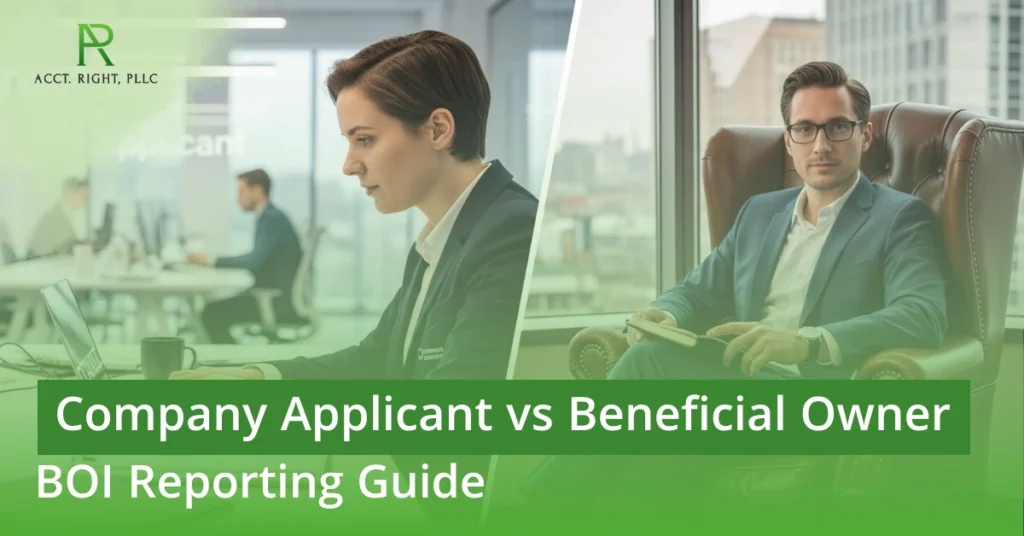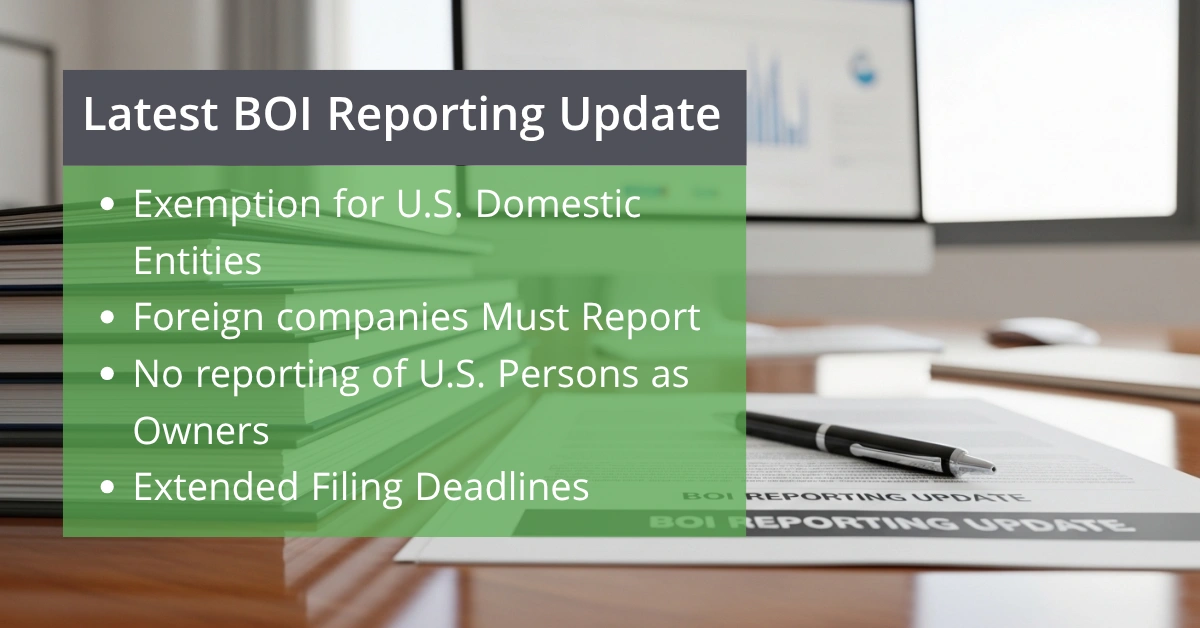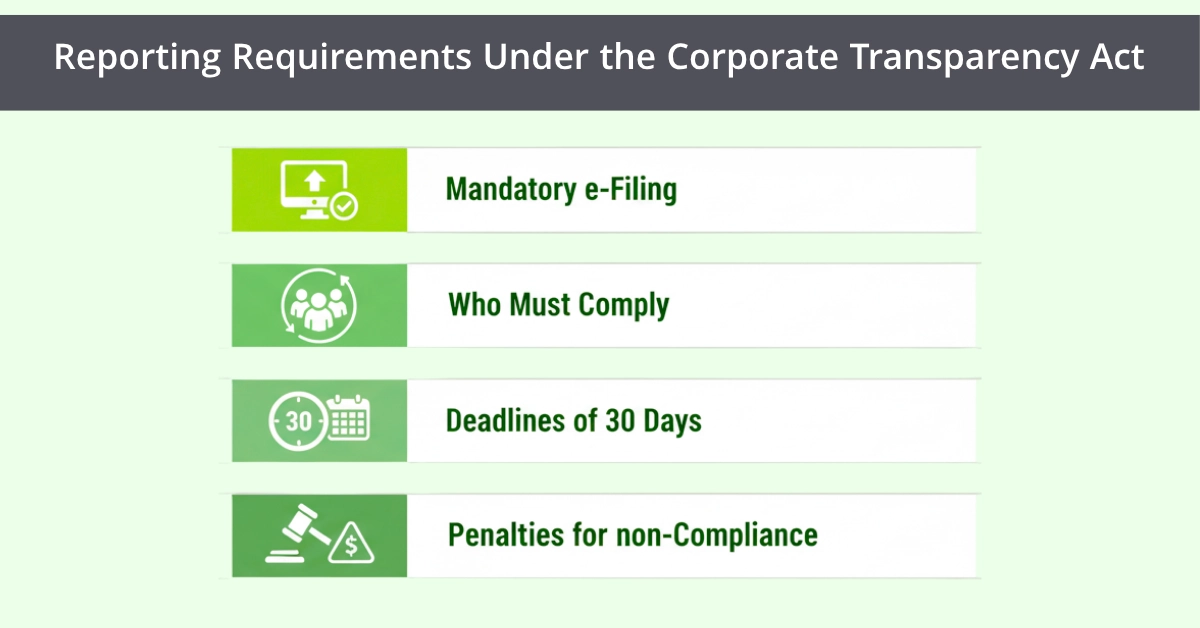
Staying compliant with federal reporting rules is no longer optional—it is essential for every business. With the Corporate Transparency Act (CTA) and the FinCEN BOI Reporting Rule now in effect, business owners in 2025 are asking an important question: What is the difference between a company applicant and a beneficial owner?
Although both terms sound similar, their roles in business compliance are very different. Understanding this distinction is crucial if you want to avoid penalties for BOI non-compliance and ensure your business is fully aligned with FinCEN compliance requirements.
At Acct. Right PLlc, we guide many clients through business entity formation, tax compliance, and BOI reporting. In this article, we will break down the differences, share real-world scenarios, and explain how professional assistance can save time, stress, and costly mistakes.
Latest BOI Reporting Update (Effective March 2025)
On March 26, 2025, FinCEN issued an interim final rule significantly revising BOI filing requirements. Here’s what changed:
What Changed:
- U.S. domestic entities are now exempt from BOI reporting.
- Only foreign reporting companies (formed abroad and registered to do business in the U.S.) are required to file BOI reports.
- U.S. persons no longer need to be reported as beneficial owners of foreign entities.
- Filing deadlines for foreign entities were extended and clarified.
These changes eliminate the BOI obligation for most U.S. LLCs, corporations, and partnerships. However, foreign entities registered in the U.S. still must comply.

Important Note on Historical Reporting
Before March 26, 2025, U.S. domestic companies were required under BOI rules to submit details about their company applicants and beneficial owners in their initial filings. However, as of March, U.S. companies and their beneficial owners are exempt from new BOI reporting obligations under the interim final rule.
These changes eliminate the BOI obligation for most U.S. LLCs, corporations, and partnerships. However, foreign entities registered in the U.S. must still comply.
What is a Company Applicant?
A company applicant is the person responsible for filing the documents to form a business. They are essentially the individual who “creates” the business in the eyes of the government.
- In most cases, this is the person who files LLC registration documents or corporate formation paperwork with the state.
- A company applicant could be the business owner, a lawyer, or a registered agent hired to complete the filing.
Examples of Company Applicants to Understand
- A small business owner filing their own LLC online
- An attorney who prepares and submits incorporation paperwork
- A registered agent service handling the registration
Company Applicant Role in BOI
- Only relevant at the time of formation
- Reported once under BOI (if required)
- As of 2025, only foreign entities need to report company applicants
What is a Beneficial Owner?
A beneficial owner is different from a company applicant. A beneficial owner is any individual who:
- Owns or controls 25% or more of a company’s shares, or
- Exercises substantial control over the company, even without direct ownership.
Beneficial owners are reported under the Beneficial Ownership Information (BOI) filing requirement managed by the Financial Crimes Enforcement Network (FinCEN).
Example Scenario
Three friends, David, Emily, and Mike, own a consulting firm.
- David owns 40% of the shares.
- Emily owns 30%.
- Mike owns 30%.
All three are beneficial owners because they meet the 25% threshold. Even if Mike only owned 10% but controlled all business decisions as CEO, he could still qualify as a beneficial owner due to his substantial control.
Note: As of October 2025, U.S. businesses do not need to report beneficial owners to FinCEN, unless they are foreign entities registered in the U.S.
Company Applicant vs Beneficial Owner: The Key Differences
| Factor | Company Applicant | Beneficial Owner |
| Definition | A person who files formation documents (LLC/Corp). | An individual who owns or controls 25%+ or has significant control. |
| Stage of Involvement | At business formation only. | Throughout the business lifecycle. |
| Reporting Requirement | Reported once at company formation. | Disclosed in BOI reporting and updated when changes occur. |
| Example | Lawyer filing incorporation papers. | Shareholder owning 30% of the company. |
| Compliance Impact | Minimal ongoing role. | Central to corporate transparency and compliance. |
A beneficial owner can be a shareholder, but not all shareholders are beneficial owners, especially in layered ownership structures.
BOI Filing Requirements in 2025
Who Must Still Report?
- Foreign companies registered to do business in any U.S. state
(e.g., a Canadian LLC registered in Texas)
BOI Reporting Deadlines:
| Company Type | Deadline |
| Foreign entities registered before Mar 26, 2025 | Must file by April 25, 2025 |
| Foreign entities registered after Mar 26, 2025 | Must file within 30 calendar days |
| U.S. domestic companies | No BOI reporting required (as of Oct 2025) |
What You Must Report:
- Legal name, address, and jurisdiction of formation
- Names, dates of birth, and addresses of beneficial owners
- ID numbers and documents for each person
- Company applicant info (if applicable)
Just like BOI reporting under the Corporate Transparency Act, nonprofit organizations face strict federal requirements through Form 990 filings. Learn more in our 2025 Guide to IRS Form 990 Instructions and Schedules.
Reporting Requirements Under the Corporate Transparency Act (CTA)
The Corporate Transparency Act was created to improve corporate ownership transparency and prevent illegal activities such as money laundering. To comply, businesses must report details about both company applicants and beneficial owners.
Key Points to Know
- Beneficial Ownership Information (BOI) reporting must be submitted through the BOI e-filing portal.
- All reporting companies (LLCs, corporations, certain partnerships) must comply unless they qualify as exempt entities under the CTA.
- Deadlines vary depending on whether the company is newly formed or already in existence. New companies must report within 30 days of formation, while existing businesses follow FinCEN’s specified timeline.
- Non-compliance can result in significant fines and criminal penalties.

Common Compliance Challenges Businesses Face
Businesses often find BOI reporting complex due to:
- Difficulty identifying indirect ownership structures.
- Confusion around ownership disclosure requirements.
- Concerns about reporting company obligations and missing deadlines.
- Underestimating the risk of penalties for BOI non-compliance.
At Acct. Right, PLLC, we specialize in guiding businesses through these complexities with tailored, reliable compliance services.
Choose Acct. Right PLLC for BOI Reporting & Compliance
We proudly serve individuals, real estate investors, healthcare professionals, and businesses across industries with:
- BOI Filing Services: We handle the complete preparation and submission of your beneficial ownership reports, ensuring accuracy and timeliness.
- Outsourced Compliance Solutions: Focus on growing your business while we manage your corporate compliance tasks.
- Business Formation and Tax Filing: From LLC registration to business tax filings (1120, 1120S, 1065), we cover it all.
- Fractional CFO Services: Strategic financial planning, budgeting, forecasting, and cash flow management tailored to your goals.
- Industry-Specific Expertise: Deep knowledge in real estate, healthcare, e-commerce, and more for personalized advice.
Our commitment to excellence means you get accurate, timely, and transparent service you can trust.
Conclusion
Understanding the difference between a company applicant and a beneficial owner is more than legal terminology. It is critical for protecting your business from costly compliance mistakes. A company applicant is linked to formation. A beneficial owner is tied to ownership and ongoing control. With the Corporate Transparency Act in effect, every business must comply with FinCEN regulations and BOI reporting obligations.
Don’t risk hefty penalties or compliance headaches. Partner with Acct. Right, PLLC, your expert accounting and tax solutions firm, to ensure seamless reporting, compliance, and strategic financial guidance.
Disclaimer:
This content is for informational purposes only and does not replace professional advice. For guidance specific to your business, please consult our team or a qualified expert. Some images may be AI-generated or illustrative.
Frequently Asked Questions
Who needs to file as a company applicant?
Anyone who files the initial registration paperwork, such as a lawyer, accountant, or business owner.
Do all businesses need to report beneficial owners?
Most LLCs and corporations must file unless they qualify as exempt entities under the CTA.
What is the BOI reporting deadline?
- New companies: Must report within 30 days of formation.
- Existing companies: Must file by the deadline set by FinCEN.
What happens if I do not comply with BOI reporting?
Non-compliance can lead to civil and criminal penalties, including fines.
Can an accounting firm handle BOI compliance for me?
Yes. Accounting & Tax Solutions firms can manage your BOI report and ensure compliance.




